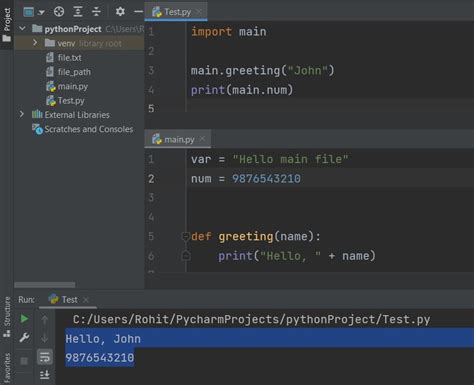Are you having trouble with an already imported module in Python? It can be frustrating when you load a module into your script, only to realize later on that you don’t need it. Thankfully, there is a solution that many Python developers don’t know about – unimporting the module.
In this article, we’ll show you how to unimport an already imported module in Python. We’ll explain why you might want to do this, and provide step-by-step instructions that are easy to follow. Whether you’re a beginner or an experienced developer, this guide will help you solve your Python problem and get back to coding.
Don’t let an unused module slow down your Python script. With our Python tips, you’ll learn everything you need to know about unimporting a module. So why wait? Read on to discover how to unimport an already imported module in Python today!
“How To Unimport A Python Module Which Is Already Imported?” ~ bbaz
Unimporting a Module in Python: A Comprehensive Guide
If you’re a Python developer, you’ve likely encountered the frustration of loading an unnecessary module into your script. In this article, we’ll show you how to unimport an already imported module in Python, so you can streamline your code and optimize your project’s performance.
What is Unimporting?
Unimporting is the process of removing an imported module from your Python script. This can be useful if you realize that you don’t actually need the module, or if it’s causing conflicts with other parts of your code.
Why Unimporting Can Be Helpful
Unimporting can be helpful for a few reasons:
- Reducing Memory Usage: By removing unnecessary modules, you can reduce the amount of memory your Python script uses. This can result in faster execution times and improved performance overall.
- Avoiding Conflicts: Some modules can cause conflicts with other parts of your code, particularly if they share function names or variable names. Unimporting can help you avoid these conflicts and ensure that your code runs smoothly.
- Simplifying Your Code: Removing unnecessary modules can make your code simpler and easier to read, especially for others who may need to work on your project in the future.
How to Unimport a Module
Unimporting a module in Python is actually quite simple. Here’s how to do it:
- Find the line in your script that imports the module you want to unimport.
- Add the following lines immediately after the import line:
import sys,del sys.modules['module_name'], replacing ‘module_name’ with the name of the module you want to unimport. - Save your script and run it again.
An Example:
Let’s say you have a script that imports the math module, but you realize later on that you don’t actually need it. Here’s how to unimport it:
import math import sys del sys.modules['math']
When Not to Unimport
While unimporting can be helpful in certain situations, there are times when it’s not advisable:
- Removing Essential Modules: Be careful not to remove essential modules that your code relies on. This can cause your script to fail, or worse, introduce security vulnerabilities.
- Inhibiting Debugging: If you unimport a module while you’re debugging your script, it can make it more difficult to diagnose issues or errors.
Conclusion
Unimporting a module in Python is a straightforward process that can help streamline your code, improve performance, and avoid conflicts. However, it’s important to exercise caution when unimporting, as removing vital modules can have serious consequences for your project.
Comparison Table
| Importing | Unimporting |
|---|---|
| Loads the module into memory | Removes the module from memory |
| Can increase memory usage | Can reduce memory usage |
| Can cause naming conflicts | Can avoid naming conflicts |
Opinion
In my opinion, unimporting can be a useful technique for optimizing your code and simplifying your project. However, it’s important to use it judiciously and with caution, since removing essential modules or inhibiting debugging can cause more harm than good.
Thank you for reading this article on how to unimport an already imported module in Python. We hope you found these tips helpful and that they will make your programming experience more efficient and productive.
Python is an incredibly versatile language with a wide range of uses, and mastering its many features and functions can be challenging. However, with the right tools and resources, you can quickly become a proficient Python programmer.
If you have any questions or comments about this article or other topics related to Python programming, please feel free to leave them below. Our team of experts is always happy to answer your questions and help you improve your skills. Thank you again for taking the time to read this article, and we look forward to hearing from you soon!
Here are some common questions that people ask about how to unimport an already imported module in Python:
- What is the purpose of unimporting a module in Python?
- How do you unimport a module in Python?
- What happens when you unimport a module in Python?
Answers:
- Unimporting a module in Python allows you to remove it from the current namespace, freeing up memory and preventing potential conflicts with other modules that share the same name or use similar functions.
- You can unimport a module in Python by using the
importlib.reload()function. This function reloads the module and updates its contents in the namespace. - When you unimport a module in Python, any references to objects or functions from that module will become invalid and may cause errors if you try to use them again. Therefore, it’s important to carefully manage your imports and only unimport modules when necessary.




